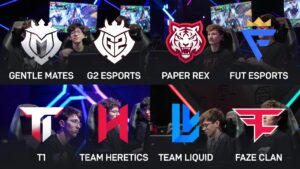Look Sports Media – A recent survey paints a compelling picture of the UK’s burgeoning esports landscape. Commissioned by Ygam, a UK-based safeguarding charity, and Mumsnet, an online parenting forum, the research reveals a staggering statistic: nearly a quarter of young boys aged 9-10 aspire to become professional esports athletes. This finding, based on over 1,000 parents of children aged 7-17, highlights the significant influence gaming holds in the lives of young Britons and the growing appeal of esports as a viable career path.
The survey also uncovered concerning trends. Teenage boys (15-17) reported an average of 34 hours of weekly gaming, sparking parental anxieties about screen time and video game addiction. A significant 80% of parents expressed concerns about their children’s screen time, while two-thirds worried about potential addiction. Furthermore, over half (52%) of parents observed gambling-like mechanics, such as loot boxes, within the games their children play. Despite these concerns, a resounding 96% of parents acknowledged the positive aspects of gaming, citing stress reduction and the development of valuable skills like digital literacy and problem-solving.

The strong interest in professional esports among young boys is undeniable. With over two-thirds of parents expressing support for their children pursuing esports careers, the future looks bright for the UK’s esports scene. Helen Martin, Ygam’s Interim CEO, emphasizes the industry’s exciting growth and the increasing number of opportunities it offers young people. This aligns with the growing global recognition of esports, exemplified by events like the BLAST Premier London Open, which Mayor Sadiq Khan predicted would boost London’s economy by £30 million.

Related Post
However, a significant disparity exists. While the UK government has pledged £30 million to the gaming industry as part of a larger creative industries investment, this funding notably excluded the esports sector. This oversight is perplexing, given the clear passion and potential within the UK’s young esports talent pool, as evidenced by the success of British stars like Jake "Boaster" Howlett and William "mezii" Merriman. The lack of targeted government investment raises questions about the UK’s commitment to nurturing its burgeoning esports ecosystem and maximizing the economic and social benefits it offers. The future of UK esports hinges on bridging this gap between grassroots enthusiasm and strategic national support.










Leave a Comment